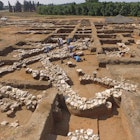
Oct 9, 2019 тЂ 2 min read
Aug 25, 2020 тЂ 2 min read

The soap-making workshop uncovered in a home from the Islamic period ТЉ Emil Aladjem/Israel Antiquities Authority
Archaeologists in Israel have discovered a 1300-year-old soap-making workshop near Rahat in the Negev Desert. It was found at a site inside a wealthy home dating back to the Islamic period, during an extensive archaeological excavation managed by the Israel Antiquities Authority.

The production of olive oil soap in the region was a significant industry in the region from the Middle Ages until the early 20th century. During the soap-making process, olive oil was used as the base material, mixed with ashes produced by burning salsola soda plants, which contain potash and water. The mixture was cooked for about seven days and then transferred to a shallow pool, where the soap hardened for about ten days until it could be cut into bars. These were piled for additional drying, and the final product was ready after an additional period of two months. The site at Rahat displays facilities associated with this industry.
тThis is the first time that a soap workshop as ancient as this has been discovered, allowing us to recreate the traditional production process of the soap industry," says Dr Elena Kogen Zehavi, excavation director at Israel Antiquities Authority. "For this reason, it is unique. We are familiar with important soap-making centers from a much later period т the Ottoman period. These were discovered in Jerusalem, Nablus, Jaffa and Gaza.т

Farmhouses and a pair of ancient board games were also discovered at the excavation site, in which local Bedouin residents, university students and students in pre-military preparatory programs worked. These include a round limestone disc used for a strategy game called the тWindmill,т which existed as early as the second and third centuries. A second gameboard known as тHounds and Jackals,т or тFifty-eight Holes,т was also found, a game that stretches back at least 4000 years. Rahatтs mayor, Fahiz Abu Saheeben, hopes to eventually build a visitorsт center that celebrates the regionтs deep history.
Lockdowns are easing globally as the planet adjusts to a new normal. Find out how COVID-19 is changing travel.
Remote volunteers discover archaeological sites galore in lockdown
Archaeologists uncover 7000-year-old Aboriginal artefacts underwater


Oct 9, 2019 тЂ 2 min read



Aug 16, 2023 тЂ 9 min read

May 26, 2020 тЂ 11 min read



Oct 8, 2018 тЂ 2 min read
